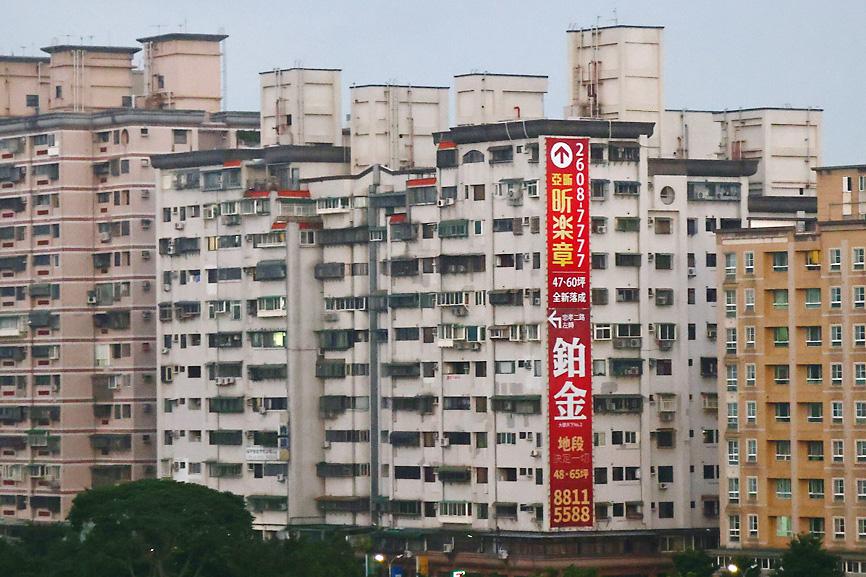The nation’s housing price index in the second quarter of this year rose 0.67 percent from three months earlier to 105.9 as home prices picked up across Taiwan on the back of real demand and asset allocation needs, Ministry of the Interior data showed.
Tainan reported the biggest advance at 1.31 percent, followed by Taichung’s 1.19 percent, Taoyuan’s 0.68 percent and Kaohsiung’s 0.38 percent gain, the data showed.
Housing prices inched up 0.2 percent in Taipei and 0.09 percent in New Taipei City.

Photo: Ann Wang, Reuters
The price hikes came even though Taiwan’s GDP contracted 0.58 percent during the April-to-June period when the COVID-19 pandemic inhibited consumer spending, but failed to weaken interest in real estate.
Deputy Minister of the Interior Hua Ching-chun (花敬群) said the price increase had to do with improving infrastructure in central and southern Taiwan, which explains why the uptick was less evident in the greater Taipei area.
Compared with a year earlier, the housing price index grew at an average of 1.38 percent, the data showed.
Meanwhile, housing affordability improved as the average mortgage burden fell 0.66 percent from the previous quarter and 1.42 percent from a year earlier to 34.64 percent, the ministry said.
Lower borrowing costs accounted for lower mortgage burdens in almost all parts of Taiwan except Taipei, it said.
The central bank in March cut the rediscount rate to a record low of 1.125 percent in the hope of easing financial burden on households amid the pandemic.
State-run and private lenders took the cue and reduced their interest rates.
Mortgage burden declined 2.58 percent in Taichung, fell 1.9 percent in New Taipei City and shrank 0.92 percent in Taoyuan, the ministry said.
Tainan and Kaohsiung saw mortgage payments softening 0.63 percent and 0.75 percent respectively, it said.
Taipei bucked the decline with a 0.51 percent gain to 57.57 percent, it said.

South Korea’s equity benchmark yesterday crossed a new milestone just a month after surpassing the once-unthinkable 5,000 mark as surging global memory demand powers the country’s biggest chipmakers. The KOSPI advanced as much as 2.6 percent to a record 6,123, with Samsung Electronics Co and SK Hynix Inc each gaining more than 2 percent. With the benchmark now up 45 percent this year, South Korea’s stock market capitalization has also moved past France’s, following last month’s overtaking of Germany’s. Long overlooked by foreign funds, despite being undervalued, South Korean stocks have now emerged as clear winners in the global market. The so-called “artificial intelligence

NEW IDENTITY: Known for its software, India has expanded into hardware, with its semiconductor industry growing from US$38bn in 2023 to US$45bn to US$50bn India on Saturday inaugurated its first semiconductor assembly and test facility, a milestone in the government’s push to reduce dependence on foreign chipmakers and stake a claim in a sector dominated by China. Indian Prime Minister Narendra Modi opened US firm Micron Technology Inc’s semiconductor assembly, test and packaging unit in his home state of Gujarat, hailing the “dawn of a new era” for India’s technology ambitions. “When young Indians look back in the future, they will see this decade as the turning point in our tech future,” Modi told the event, which was broadcast on his YouTube channel. The plant would convert

‘SEISMIC SHIFT’: The researcher forecast there would be about 1.1 billion mobile shipments this year, down from 1.26 billion the prior year and erasing years of gains The global smartphone market is expected to contract 12.9 percent this year due to the unprecedented memorychip shortage, marking “a crisis like no other,” researcher International Data Corp (IDC) said. The new forecast, a dramatic revision down from earlier estimates, gives the latest accounting of the ongoing memory crunch that is affecting every corner of the electronics industry. The demand for advanced memory to power artificial intelligence (AI) tasks has drained global supply until well into next year and jeopardizes the business model of many smartphone makers. IDC forecast about 1.1 billion mobile shipments this year, down from 1.26 billion the prior

People stand in a Pokemon store in Tokyo on Thursday. One of the world highest-grossing franchises is celebrated its 30th anniversary yesterday.